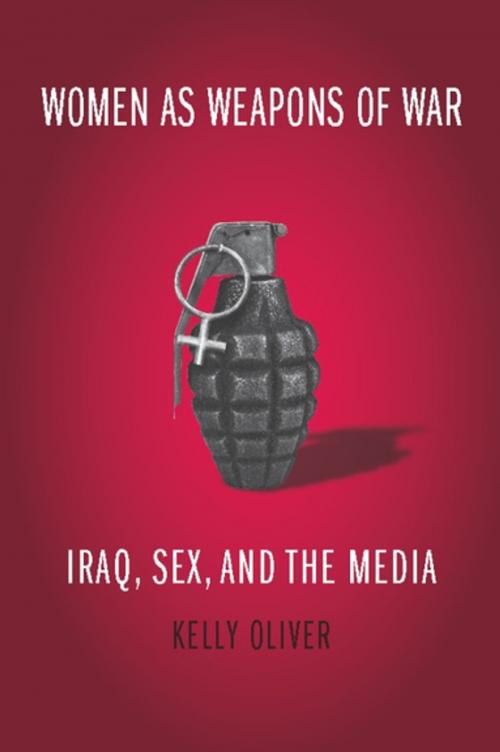Women as Weapons of War
Iraq, Sex, and the Media
Nonfiction, Religion & Spirituality, Philosophy, Political, Social & Cultural Studies, Social Science, Gender Studies, Women&| Author: | Kelly Oliver | ISBN: | 9780231512459 |
| Publisher: | Columbia University Press | Publication: | November 2, 2007 |
| Imprint: | Columbia University Press | Language: | English |
| Author: | Kelly Oliver |
| ISBN: | 9780231512459 |
| Publisher: | Columbia University Press |
| Publication: | November 2, 2007 |
| Imprint: | Columbia University Press |
| Language: | English |
Ever since Eve tempted Adam with her apple, women have been regarded as a corrupting and destructive force. The very idea that women can be used as interrogation tools, as evidenced in the infamous Abu Ghraib torture photos, plays on age-old fears of women as sexually threatening weapons, and therefore the literal explosion of women onto the war scene should come as no surprise.
From the female soldiers involved in Abu Ghraib to Palestinian women suicide bombers, women and their bodies have become powerful weapons in the Afghanistan and Iraq wars. In Women as Weapons of War, Kelly Oliver reveals how the media and the administration frequently use metaphors of weaponry to describe women and female sexuality and forge a deliberate link between notions of vulnerability and images of violence. Focusing specifically on the U.S. campaigns in Afghanistan and Iraq, Oliver analyzes contemporary discourse surrounding women, sex, and gender and the use of women to justify America's decision to go to war. For example, the administration's call to liberate "women of cover," suggesting a woman's right to bare arms is a sign of freedom and progress.
Oliver also considers what forms of cultural meaning, or lack of meaning, could cause both the guiltlessness demonstrated by female soldiers at Abu Ghraib and the profound commitment to death made by suicide bombers. She examines the pleasure taken in violence and the passion for death exhibited by these women and what kind of contexts created them. In conclusion, Oliver diagnoses our cultural fascination with sex, violence, and death and its relationship with live news coverage and embedded reporting, which naturalizes horrific events and stymies critical reflection. This process, she argues, further compromises the borders between fantasy and reality, fueling a kind of paranoid patriotism that results in extreme forms of violence.
Ever since Eve tempted Adam with her apple, women have been regarded as a corrupting and destructive force. The very idea that women can be used as interrogation tools, as evidenced in the infamous Abu Ghraib torture photos, plays on age-old fears of women as sexually threatening weapons, and therefore the literal explosion of women onto the war scene should come as no surprise.
From the female soldiers involved in Abu Ghraib to Palestinian women suicide bombers, women and their bodies have become powerful weapons in the Afghanistan and Iraq wars. In Women as Weapons of War, Kelly Oliver reveals how the media and the administration frequently use metaphors of weaponry to describe women and female sexuality and forge a deliberate link between notions of vulnerability and images of violence. Focusing specifically on the U.S. campaigns in Afghanistan and Iraq, Oliver analyzes contemporary discourse surrounding women, sex, and gender and the use of women to justify America's decision to go to war. For example, the administration's call to liberate "women of cover," suggesting a woman's right to bare arms is a sign of freedom and progress.
Oliver also considers what forms of cultural meaning, or lack of meaning, could cause both the guiltlessness demonstrated by female soldiers at Abu Ghraib and the profound commitment to death made by suicide bombers. She examines the pleasure taken in violence and the passion for death exhibited by these women and what kind of contexts created them. In conclusion, Oliver diagnoses our cultural fascination with sex, violence, and death and its relationship with live news coverage and embedded reporting, which naturalizes horrific events and stymies critical reflection. This process, she argues, further compromises the borders between fantasy and reality, fueling a kind of paranoid patriotism that results in extreme forms of violence.















